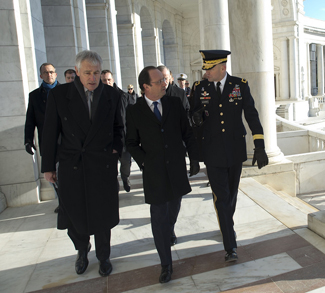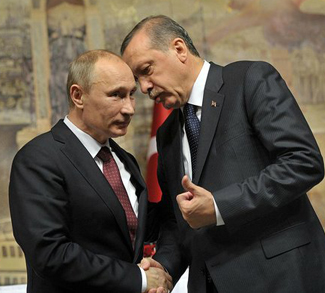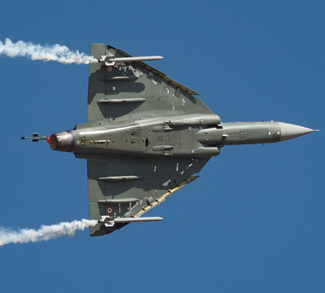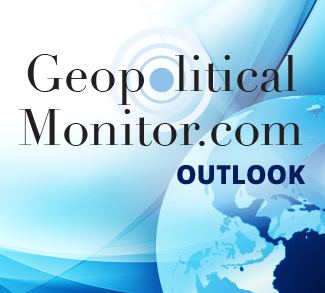It is a time of revival in the Middle East. And much like Russia, there is mounting evidence that France is exploiting the war in Syria to stage a comeback in the region.
On February 15, the French Foreign Ministry bluntly pointed the finger at the Syrian government for the failure of the second round of peace talks in Geneva. Earlier this month, Paris had voiced concern about Damascus’ delays in delivering its chemical weapons to the international community under the program mediated by the United States and Moscow last fall.
France and the United States have reportedly given Saudi Arabia and Qatar the green light to mastermind the recent offensive of “moderate” Islamist insurgents against the al-Qaeda-linked Islamic State of Iraq and al-Sham (ISIS), in a war within the three-year-long civil war pitting forces loyal to Syrian President Bashar al-Assad against the rebellion.
Among Western powers, Paris is the most supportive of the Syrian National Coalition, the main opposition group against Assad and his acolytes on paper. In the aftermath of the chemical attack in Damascus’ suburbs late in August 2013, and ahead of US President Barack Obama’s turnaround and accommodation with the Kremlin to dismantle Syria’s chemical arsenal, the French government aligned with the White House for punitive military action against the Syrian regime.
All the same, French intelligence would have an open channel with the Assad government to monitor the flow of European citizens filling the ranks of jihadist rebels in the Levant, according to a January 15 report by Reuters.
While Washington’s interest in the Middle East appears to be waning as a consequence of its strategic rebalancing to the Far East and its primary focus on economic recovery and energy self-sufficiency, the government of French President Francois Hollande is trying to carve out a prominent role in the area spanning from the eastern Mediterranean Sea to the Persian Gulf by pandering to Washington’s search for burden-sharing in that turbulent space.
France and the United States have already given rise to a geostrategic division of labor by pooling military and diplomatic assets in Africa, where Paris still vaunts an informal empire to defend from the Saharan-Sahelian basin to the Gulf of Guinea.
After its West African colonies won independence in the early 1960s, France has continued to exert political and economic leverage over them. This system of indirect rule, later renamed “Françafrique,” has been nurtured for years by proverbial back channels of influence-peddling involving French rulers of whatever political stripe and their African counterparts.
The armed interventions that France is conducting in Mali and the Central African Republic (CAR) have showcased its readiness to dispatch military personnel and hardware from both permanent and temporary bases in Burkina Faso, Niger, Chad, Senegal, Ivory Coast, and Cameroon.
However, the Middle East is hardly Africa. In spite of its past as a colonial power in Syria and Lebanon, Paris is now a parvenu of sorts in this area, where it cannot rely on a system of power comparable to Francafrique.
France maintains a military base in the United Arab Emirates (UAE), but for the time being this seems to be a diplomatic tool rather than an operational outpost connecting the Arabian Peninsula with its military installations in Djibouti, in the Horn of Africa. Diplomacy and not power politics is also behind Paris’ participation in the United Nations Interim Force in Lebanon (UNIFIL), in which its 830 peacekeepers remain substantially “neutralized” along the Israeli-Lebanese border.
France keeps having fluctuating relations with the Israeli government. Paris has been recently accused by Israel’s Foreign Ministry of having biased, pro-Palestinian tendencies like Italy, Britain and Spain, while its tough position over the Iranian nuclear program has been praised by Israeli Prime Minister Benjamin Netanyahu. Furthermore, the French government has from the outset expressed aversion to Tehran’s possible involvement in the Syrian peace process.
After the breakout of the civil confrontation in Syria, France has reinforced its ties with the Qatari sheikdom. Paris and Doha have in stages promoted the creation of protected civilian zones in northern Syria, along the Turkish border. Now that from Egypt to Syria the influence of Qatar over the Arab revolts appears to be declining to Saudi Arabia’s advantage, France is cementing a community of interests with the Saudi Kingdom.
In August 2013, Defense News reported that France had secured a $1.3 billion defense deal to upgrade Riyadh’s two refuelling vessels and four frigates. Two months later, the French military held joint drills with the Saudi armed forces in the mountains of Taif, near Mecca. In addition, during Hollande’s visit to Saudi Arabia at the end of December 2013, Paris and Riyadh devised a commercial triangulation under which the Lebanese army would buy French military equipment through a $3 billion grant from the Saudi government.
Though France is gaining ground in the Middle East, it is quite far from being considered an autonomous player in the region.
Suffice it to say that France still depends on US military technology and expertise. The armed intervention that the North Atlantic Treaty Organization (NATO) unleashed against the Libyan regime of Muammar Gaddafi in 2011, whose command was in the hands of Paris and London, highlighted the inability of European countries to run military operations without US support in intelligence, surveillance and reconnaissance (ISR) activities and air-to-air refueling.
France-led military action against Islamist militants in northern Mali is suffering the same operational problems that plagued the NATO mission in Libya. In mid-December 2013, French Defense Minister Jean-Yves Le Drian remarked that the 12 Reaper drones planned to hunt down jihadist fighters across the Sahel had been bought from the US General Atomics, since no European defense enterprise could provide this kind of surveillance assets, whose individual development would demand prohibitive high investments for the Old Continent’s cash-strapped nations.
Countries such as Saudi Arabia, which are apparently trying to diversify their diplomatic and military ties away from the special relationship with the United States, had better assess the strengths and weaknesses of France’s bid for a refurbished geopolitical “grandeur” in the Middle East.




